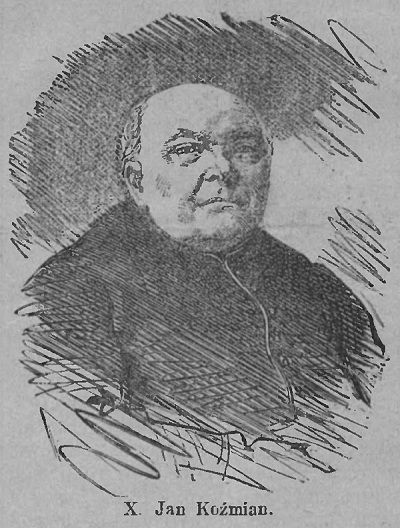He was born in the village of Wronowo (in the Lublin District) on the 27th of December, 1814, into a wealthy land-owning family, as a brother of Stanisław Egbert Koźmian and nephew of Kajetan Koźmian – both respected scholars and thinkers. He was educated in Lublin and then in a secondary school in Warsaw, where he obtained his final certificate in 1830. During the November Uprising, he served as an N.C.O. in an artillery unit. After the fall of the uprising, he emigrated to France, where he completed legal studies (Toulouse, 1832-38). Having settled down in Paris, he remained in close contact with, for instance, Adam Mickiewicz, and he was one of the co-editors of the “Trzeci Maj”periodical of the Hotel Lambert camp. He also entered into contact with representatives of French Catholic circles – such as Charles de Montalembert, or Louis Veuillot – and became a lay brother of the Congregation of the Resurrection of Our Lord Jesus Christ that was founded at that time. In 1845 he began editing the ultramontanic “Przegląd Poznański” magazine. In the following year he married a daughter of a well-known activist from Greater Poland - General Dezydery Chłapowski. Released by the Prussians, by whom he was captured in the spring of 1848 as a member of an academic legion, Koźmian retired to his wife’s estate in Greater Poland. Critical of the Italian unification movement and the January Uprising, he presented a hostile attitude towards both the ‘cosmopolitan radicalism’ with its conspiratorial activity and the tyranny of the modern state. Following his wife’s suicide (1853), in 1857 he took up studies at a theological college in Rome. Having been ordained priest in 1860, he became the parish-priest in Krzywiń; then the chaplain of the Sisters Servants of the Sacred Heart in Poznań (until 1873), endowing schools for the poor and charitable societies. In 1867 he became the secretary of Archbishop Mieczysław Ledóchowski, and two years later he received the title of the papal majordomo and Protonotary Apostolic, and in 1870, already as a Canon of Poznań, he accompanied the Archbishop in his mission to the Prussian headquarters in Versailles. Implicated in the alleged preparations to an attempt on Bismarck’s life, Koźmian was arrested as soon as the ‘Kulturkampf’ began. After his release from prison he ran the ultramontanic “Kuryer Poznański” and was appointed the Apostolic legatee to the Archdiocese of Poznań. He died in Venice on the 20th of September, 1877, on the way back from Rome to Poland. His major works are the articles published in “Przegląd Poznański”: Stan rzeczy w Wielkim Księstwie Poznańskim (1847), Rzeczy włoskie (1848), Przeznaczenia Francji (1849), Nowy Rok (1850), and Pisma (three volumes; 1881).

